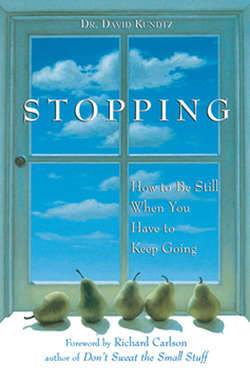Читать книгу Stopping - David Kundtz - Страница 14
На сайте Литреса книга снята с продажи.
ОглавлениеMillions of persons long for immortalitywho do not know what to do withthemselves on a rainy afternoon.
SUSAN ERTZ
7
Stopping Before Everything
Stopping is a gentle art and is like an encouraging word that urges us to make the right decisions and choices: the ones we really want and the ones that are life-giving. These decisions are both the big, life-changing ones such as a career change, starting or ending a marriage, or moving to a new home, as well as the smaller, day-to-day ones such as, This purchase? That sales pitch at work? Tell her now or wait ’til later? In both senses of the phrase, Stopping comes before everything: Stopping should chronologically precede everything we do as well as assume a position of priority in our lives.
This is no small adjustment for most of us. This is a change in direction that will affect all the aspects of our lives. But I am not afraid that clearly stating the magnitude of the change will prompt you to say, “This is asking for too great a change. I don't think I want to get into this.” I am not afraid to tell the truth because the results are so promising: Not only will you find more moment-to-moment peace, but you will also find clarification of, even the discovery of, your life. Is there anything more important? And could there be anything much worse than knowing—when you are at the end of your life or even at the end of your day—that you missed it?
In both of my fields of work, priesthood and counseling, I have had many occasions to be with people as they are dying. At those moments, the saddest words to hear, and not the least common, are “If only I had known!” or “If only someone had told me!” The implication is that they would have lived their lives very differently and more in line with the truth they now see at the time of their death. And now, of course, they know it's too late. The realization brings a deep sadness.
This has led me to ask myself: Would they really have changed if they knew then what they know now? What if someone had revealed the truth to them? Would that have made a difference? My questions remain answerless until I direct them at myself: What do I need to know now so that I will not be in that situation? Since, as an adult, it is no one's responsibility to tell me what I need to know, what is it that must I tell myself? These are questions that will be answered only in the stillness that allows the hearing of difficult truths and in the slowness that allows me to notice them.
This brings us to another point. It is so obvious that it often escapes our attention. It is this: slowness fosters remembering and speed engenders forgetting. Czech novelist Milan Kundera makes this point eloquently in his novel, Slowness. It is a point not only fundamental to the understanding of Stopping, but essential to living successfully in today's world: “There is a secret bond between slowness and memory, between speed and for-getting. Consider this utterly commonplace situation: a man is walking down the street. At a certain moment, he tries to recall something, but the recollection escapes him. Automatically, he slows down. Meanwhile, a person who wants to forget a disagreeable incident he has just lived through starts unconsciously to speed up his pace, as if he were trying to distance himself from a thing still too close to him in time.”
Does that ring a bell with you like it did with me? Think of the times when you are trying to remember; you'll notice that you become very still and possibly stare into space. And when we want to forget something? Run, and keep running! Kundera states this truth in the form of equations: “The degree of slowness is directly proportional to the intensity of memory; the degree of speed is directly proportional to the intensity of forgetting.”
The faster we go, the more we forget. Then what often happens next is that we forget that we have forgotten. What a state to be in! But when we Stop, we remember again and, therefore, find ourselves.
